I want to write a query that will update duplicates per group:
INPUT
+-------+-------+
| group | name |
+-------+-------+
| 1 | name1 |
| 1 | name1 |
| 1 | name1 |
| 1 | name2 |
| 2 | name1 |
| 2 | name1 |
| 3 | name1 |
| 3 | name2 |
+-------+-------+
OUTPUT
+-------+----------------+
| group | name |
+-------+----------------+
| 1 | name1 |
| 1 | name1 - Copy 1 |
| 1 | name1 - Copy 2 |
| 1 | name2 |
| 2 | name1 |
| 2 | name1 - Copy 1 |
| 3 | name1 |
| 3 | name2 |
+-------+----------------+
There is something like that here Renaming the duplicate data in sql but my problem is how to deal with groups. It is not so important how to name this duplicates but it will be cool if I can do it as specified in my example.
